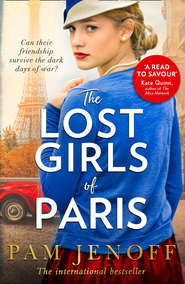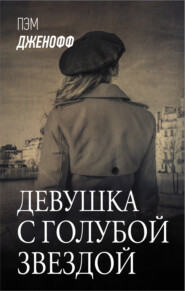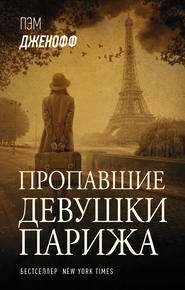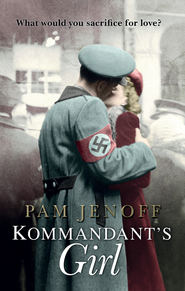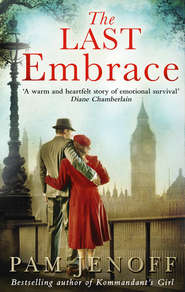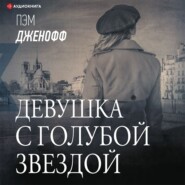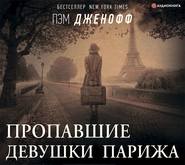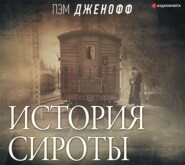По всем вопросам обращайтесь на: info@litportal.ru
(©) 2003-2024.
✖
The Orphan's Tale: The phenomenal international bestseller about courage and loyalty against the odds
Автор
Год написания книги
2018
Настройки чтения
Размер шрифта
Высота строк
Поля
I had heard them discuss this the previous evening. They used the word “aerialist,” I recall now. Through the fog of my exhaustion, I had not contemplated what it really meant. Now the outrageousness of the proposal crashes down upon me: they want me to climb to the ceiling and risk my life swinging like a monkey. I’m not captive here. I don’t have to do this. “That’s very kind of you, but I hardly think...” I don’t want to offend her. “I can’t possibly do that. I can clean, or perhaps cook,” I offer, as I had the night before.
“Herr Neuhoff owns the circus,” she informs me. “This is what he wants.” Her diction is polished, as if she is not from around here. “Of course if you can’t manage it...you have maybe a rich uncle waiting to take you in?” Though her tone is mocking, she has a point. I cannot go back to the station where surely the baby and I have both been noticed missing by now. On my own I might have kept running. But the bitter cold had nearly killed us once. We would not make it a second time.
I bite my lip. “I’ll try. Two weeks.” Two weeks will give me time to get stronger and find somewhere for Theo and me to go. We will not, of course, stay with the circus.
“We were going to give you six.” She shrugs, not seeming to care. “Let’s go.” I change into the leotard as modestly as I can beneath the gown.
“Wait.” I hesitate, looking at Theo, who still sleeps on the bed.
“Your brother,” she says, emphasizing the second word. “Theo, isn’t it?”
“Yes.”
She hesitates for a beat, watching me. Then she picks him up. I fight the urge to protest, the notion of anyone else holding him unbearable. She places him into the makeshift bassinet. “I’ve asked the housemaid, Greta, to come up and watch him.”
“He’s colicky,” I say.
“Greta has raised eight of her own. She’ll manage.”
Still I hesitate. It is more than just Theo’s care that concerns me: if the maid changes his diaper, she will learn that he is a Jew. I take in his clean outfit and realize it’s too late. Someone already knows the truth about his identity.
I follow Astrid down the stairs of the darkened house, the air musty and burnt. Then I put on my still-damp boots, which stand by the front door. She hands me my coat, and I notice that she does not wear one. Her figure is flawless, lean legs that belie her strength and a perfectly flat waist like I’d had before the baby. She is shorter than I thought the previous day. But her body is like a statue, elegant lines seemingly carved from granite.
Outside, we pad silently across the open field, our footsteps crackling against the ice. The air is dry and milder, though; had it been like this a day ago, I might have made it farther into the woods without collapsing. Moonlight shines down brightly. The night sky is filled with stars and for a second it seems that each is for one of the infants on the train. Somewhere, if they are still alive, Theo’s parents are wondering where their child has gone, hearts crying out in anguish, just as my own does. I look at the sky and send up a silent prayer, wishing they might know their son is alive.
Astrid unlocks the door to a large building. She flicks a switch and lights splutter on overhead. Inside, it is a run-down gymnasium that smells of sweat, old tumbling mats rotting in the corner. It is dingy and worn, worlds away from the glamour and sparkle I’d always associated with the circus.
“Take off your coat,” she instructs, stepping closer. Her bare arm brushes mine. My own pale skin is marred a thousand times with moles and scars, but Astrid’s is a smooth, unbroken canvas of olive, like a lake on a day without wind. She produces beige tape that she wraps around my wrists slowly and methodically, then kneels and covers my legs with chalk, taking care not to miss a single spot. Her nails are perfectly polished, but her hands are lined and coarse, unable to hide the years the way her face and body can. She must be close to forty.
Finally she pats a thick powder onto my hands. “Rosin. You must keep your hands dry always. Otherwise, you will slip. Do not assume the net will save you. If you hit too hard it will drop to the floor or you’ll be thrown off. You must land in the center of the net, not by the edge.” There is no warmth in her voice as she rattles off instructions, practiced over time, that will help to keep me from falling, or killing myself if I do. My mind reels: Does she actually think I can manage this?
She gestures that I should follow her to a ladder that stands close to one of the walls, bolted perfectly upright. “The act will have to be simplified of course,” she says, as if reminding me that I can never possibly be good enough. “It takes a lifetime of training to truly become an aerialist. There are ways to compensate so that the audience will not notice. Of course, there is no room for conjuring in the circus. The audience has to trust that all of our feats are real.”
She begins to climb the ladder with the ease of a cat, then looks down expectantly to where I stand, not moving. I scan the length of the ladder to the high ceiling. The top must be at least forty feet from the ground, with nothing below but a tired-looking net just a meter or so off the hard floor. I have never been afraid of heights, but I’ve had no cause: our house in the village was a single story and there were no mountains for hundreds of kilometers. I’ve never imagined anything like this.
“There has to be something else,” I say, a note of pleading creeping into my voice.
“Herr Neuhoff wants you to learn the aerial act,” she replies firmly. “The trapeze is actually easier than many of the other acts.” I can’t imagine anything more difficult. She continues, “I can guide you, put you where you need to be. Or not.” She looks at me evenly. “Perhaps we should go tell Herr Neuhoff that this isn’t going to work out.”
And have him cast you out into the cold, seems her unspoken conclusion. I’m not sure the kind-faced circus owner would actually do that, but I don’t want to find out. More important, I’m not going to give Astrid the satisfaction of being right.
Reluctantly, I begin climbing rung by rung, trying not to tremble. I tighten my grip, wondering when the bolts had last been checked and whether it is sturdy enough for both of us. We reach a tiny ledge, scarcely big enough for two people. I wait for Astrid to help me onto it. When she does not, I carefully squeeze myself on, standing too close beside her. She unlatches a trapeze bar from its catch.
Astrid leaps from the platform, sending it rocking so that I grasp for something to hold on to to keep myself from falling. I marvel at how she swings easily through the air, somersaulting around the bar, twirling with just one hand. Then she opens her body like a diving gull, hanging upside down beneath the bar. She rights herself and returns, aiming for the platform and landing neatly in the tiny space beside me. “Like that,” she says, as though it were easy.
I am too stunned to speak. She hands the bar to me. It is thick and unfamiliar in my hand. “Here.” She adjusts my grip impatiently.
I look from her to my hands, then back again. “I can’t possibly. I’m not ready.”
“Just hang on and swing,” she urges. I stand frozen. There have been moments when I have acknowledged death—during childbirth when life seemed to rush from my body, when I saw the babies on the train, and as I struggled through the snow with Theo just days earlier. But it lies before me more real than ever now in the abyss between the platform and the ground.
An image of my mother pops improbably into my mind. In the months since I had been gone, I’d struggled to push away thoughts of home: the patchwork quilt on my bed tucked in the alcove, the corner nook by the stove where we used to sit and read. I have not allowed myself to think of such things, knowing that if I allowed even a trickle of memories I would be drowned in a flood I could not stop. But homesickness washes over me now. I do not want to be here on this tiny platform about to leap to my death. I want my mother. I want to be home.
“Are there other aerialists?” I ask, stalling for time.
Astrid hesitates. “Two others, and one of them will help us when we get further along. But they will primarily be working on the cradle swing, or the Spanish web, which is my other act. They will not be working with us.” I am surprised. I imagine that the flying trapeze is the centerpiece of the show, the goal for any aerialist. Perhaps they do not want to work with me either.
“Come now,” she says, before I can ask further. “You can sit on the swing, if you aren’t ready. Pretend you are on a playground.” Her tone is condescending. She takes the bar and draws it close to me. “Balance just below your backside,” she instructs. I sit on it, trying to get comfortable. “Like that. Good.” She lets go. I swing out from the platform, grasping the wires on either side so tightly that they cut into my hands. There is a kind of natural flow to it, like getting your feet under you on a boat. “Now lean back.” Surely she is joking. But her voice is serious, her face unsmiling. I lean back too fast and upset my balance, nearly slipping from the seat. As I swing back closer to the platform, she reaches out and grabs the ropes above the bar, pulling me onto the board and helping me off.
She sits on the bar and swings out, then lets go. I gasp as she starts to fall. But she catches herself by her knees and swings upside down. Her dark hair fans out beneath her, and her inverted eyebrows arch toward the ground. She rights herself and climbs back onto the platform. “Hock hang,” she informs me.
“How did you come to be with the circus?” I ask.
“I was born into a circus family nearby,” she replies. “Not this one.” She hands me the bar. “Your turn, for real this time.” She puts the bar in my hand, adjusting my grip. “Jump and swing by your arms.”
I stand motionless, legs locked. “Of course if you can’t do it, I can just tell Herr Neuhoff that you quit,” she taunts once more.
“No, no,” I reply quickly. “Give me a second.”
“This time you will swing by your arms. Hold the bar down here.” She indicates a spot just below my hips. “Then raise it above your head when you jump off to get height.”
It is now or never. I take a deep breath, then leap. My feet flail and I flop helplessly like a fish on a line, the furthest thing from Astrid’s own graceful movement. But I am doing it.
“Use your legs to take you higher,” Astrid calls, urging me onward. “It’s called the kick out. Like on a swing when you were a child.” I shoot my legs out. “Keep your ankles together.” It is working, I think. “No, no!” Astrid’s voice rises even louder, her dissatisfaction echoing across the practice hall. “Keep your body in a line when you return. First in the neutral position. Head straight.” Her instructions are rapid-fire and endless and I struggle to keep them all in my head at once. “Now kick your legs back. That is called the sweep.”
I gain momentum, swinging back and forth until the air whooshes past my ears and Astrid’s voice seems to fade. The ground slips and slides beneath me. This is not so bad. I had done gymnastics for years and those muscles bounce back now. Not the flips and twists that Astrid had done, but I am managing.
Then my arms begin to ache. I cannot hold on much longer. “Help!” I cry. I had not thought about how to get back.
“You have to do it yourself,” she calls in return. “Use your legs to swing higher.” It is quite impossible. My arms are burning now. I kick my legs forward to increase my momentum. I near the board this time, but it is not enough. I am going to fall, injure myself, maybe even die, and for what? With one last desperate kick, I send myself higher.
Astrid catches the ropes as I near the board, pulling me in and helping me to my feet.
“That was close,” I pant, legs trembling.
“Again,” she says coolly, and I stare at her in disbelief. I can’t imagine getting up there once more after nearly falling, much less right away. But to earn my keep, and Theo’s, I have no other choice. I start to grab the bar once more. “Wait,” she calls. I turn back hopefully. Has she changed her mind?
“Those.” She is pointing to my breasts. I look down self-consciously. They had grown fuller since I’d given birth, even though the milk had since dried up and gone away. “They’re too big for when you are in the air.” She climbs down the ladder and returns with a roll of thick gauze. “Take down your top,” she instructs. I look down at the practice hall below to make sure no one else is there. Then I lower the leotard, trying not to blush as she binds me so tightly it is hard to breathe. She doesn’t seem to notice my embarrassment. “You’re soft here,” she says, patting my stomach, an intimate gesture that makes me pull back. “That will change with training.”
Other performers have begun to trickle into the practice hall, stretching and juggling in opposite corners. “What happened to the last girl, the one who swung with you before me?”
“Don’t ask,” she replies as she steps back to study her work. “For the show, we’ll find a corset.” So she thinks I might be able to do it after all. I exhale quietly.
“Again.” I take the bar and jump once more, this time with a bit less hesitation. “Dance, use your muscles, take charge, take flight,” she pushes, never satisfied. We work all morning on that same swinging motion, kick out, neutral, sweep. I strive hard to point my toes and make my body exactly like hers. I attempt to mimic her patterns, but my motions are clumsy and unfamiliar, a joke in comparison with hers. I improve, I think. But no praise comes. I keep trying, evermore eager to please her.
“That was not awful,” Astrid concedes at last. She sounds almost disappointed that I am not a total failure. “You studied dance?”
“Gymnastics.” More than studied, actually. I practiced six days a week, more when I could. I had been a natural and I might have gone to the national team if Papa had not declared it a worthless endeavor. Though it has been more than a year after I had last trained and my stomach is weak from childbirth, the muscles in my arms and legs are still strong and quick.






